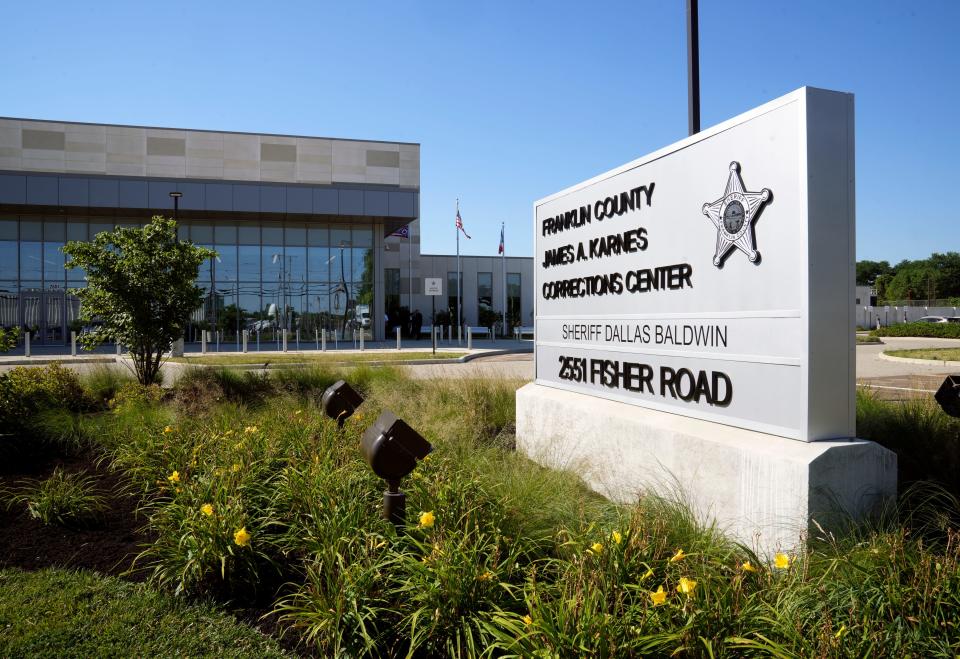Ohioans with felony records can vote. Many don't know it
Unlike other states, Ohio allows people with felony records to cast ballots if they're no longer incarcerated and allows those awaiting trial in jails to vote.
But voting rights experts say it's a common misconception that they can't.
"Too many Ohioans with past records, including felonies, don't know that they can vote," said Jen Miller, director of the League of Women Voters of Ohio.
Voting Rights:With no state standard, Ohio counties inconsistently purge convicted felons
How to vote in Ohio:What you need to know
Roughly one in 11 Ohio adults − 994,000 people − have a felony conviction and as many as one in three have a criminal record of some sort, according to Policy Matters Ohio, a Cleveland-based research group.
The National Conference of State Legislatures reports that 21 states, including Ohio, restore voting rights to people with felony records upon release from prison.
Still, it's unclear how many Ohioans with records know they can vote, get registered and exercise their rights.
The Marshall Project, a nonprofit focused on criminal justice reform, USA TODAY Network and the Louisville Courier-Journal reported last year that 13 states expanded voting rights for people with felony records between 2016 and 2020 but when examining four key states, the researchers found only a small fraction of those eligible made it onto the voter rolls in time for the 2020 election.
More:More Ohio women register to vote after abortion ruling
Registering Ohio voters with records
Almost 18,000 adults left Ohio state prisons last year, making them eligible to vote again. Thousands more, who are sitting in jails awaiting trial or serving sentences for misdemeanors, are also eligible to register and vote.

The state Department of Rehabilitation and Correction said it works with voting groups such as the Ohio Secretary of State and League of Women Voters to give people leaving prison information on how to register to vote.
Miller said League of Women Voter volunteers also visit jails and community based correctional facilities to register eligible voters but often run into roadblocks. "It depends on how well those who run that facility understand the law and how willing they are to work with us."
Smaller, independent groups also target registering folks living in halfway houses. Chazidy Bowman, founder of Opportunities People's Justice Leaders, said nearly 300 people have been registered but the biggest challenge is arranging state identification cards.
Bowman also said formerly incarcerated people are often incorrectly told by state prison officials that they are ineligible to vote. Cincinnati-based Opportunities People's Justice Leaders gives out t-shirts to those who register that advertise the right to vote and a QR code that links directly to the state's voter registration site.
Former Hamilton County Common Pleas Court Judge Nadine Allen assists with voter registration drives at jails and drug treatment facilities, where most people don't know they still have a right to vote. "When we tell them, their eyes light up − 'I can vote!' So, there is great interest."
But voter participation among people in jail can be abysmal. In jails as well as a treatment center in Hamilton County, just 70 people cast ballots in the 2020 general election. The voting numbers plummeted to just a handful in off-year elections, according to the Hamilton County Board of Elections.
In Franklin County, 124 people incarcerated in two jails voted in the 2020 general election. In Summit County Jail, 10 people voted in that election.
More:In Ohio, new efforts to tighten voter ID laws, cut early voting days underway
More:Ohio Secretary of State casts tie-breaker votes on who can be on ballot in key races
Ohio voting deadlines and rules
There’s no statewide standard that county election boards can follow to verify that convicted felons are currently incarcerated before cancelling their voter registration. To do so would require ongoing access to state and county rosters of jail inmates. So it's important for formerly incarcerated individuals to check their registration.
The deadline to register to vote for the Nov. 8 general election is Oct. 11. You can register online but you'll need an Ohio driver's license or state ID number, name, date of birth, address and the last four digits of your Social Security number.
Already registered? You can check your registration here.
Early in-person voting starts Oct. 12 at county boards of elections and absentee voting begins.
Polls are open Nov. 8 from 6:30 a.m. to 7:30 p.m. Voters must present state or federal ID, utility bill, bank statement or paycheck. Here is a list of all acceptable identification.
Get more political analysis by listening to the Ohio Politics Explained podcast
This article originally appeared on The Columbus Dispatch: Criminal record in Ohio? You're probably eligible to vote anyway

